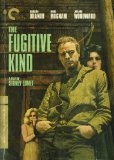| Reviews & Columns |
|
Reviews DVD TV on DVD Blu-ray 4K UHD International DVDs In Theaters Reviews by Studio Video Games Features Collector Series DVDs Easter Egg Database Interviews DVD Talk Radio Feature Articles Columns Anime Talk DVD Savant Horror DVDs The M.O.D. Squad Art House HD Talk Silent DVD
|
DVD Talk Forum |
|
|
| Resources |
|
DVD Price Search Customer Service #'s RCE Info Links |
|
Columns
|
|
|
Fugitive Kind - Criterion Collection, The
THE MOVIE:
"This is a snakeskin jacket! And for me it's a symbol of my individuality and my belief in personal freedom." - Sailor (Nicolas Cage) in David Lynch's Wild at Heart
"That's where I come from, it's not where I'm going." - Valentine (Marlon Brando) in The Fugitive Kind
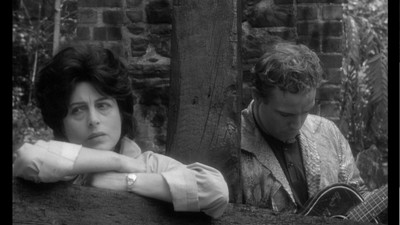
I know that New York isn't really earthquake country, but has anyone checked the records for 1959? Because surely the ground did shake when Anna Magnani and Marlon Brando met each other on the set for The Fugitive Kind. Such colossal screen talent in one place, the soil must have shuddered. That the two apparently did not get along did not matter. Such are the laws of the jungle. As performers, these two were primal.
The Fugitive Kind was directed by Sidney Lumet, most recently seen on modern movie screens helming the fantastic Before the Devil Knows You're Dead. It was adapted by Tennessee Williams and Meade Roberts from Williams's play Orpheus Descending. It reunited the playwright and Marlon Brando, who had changed acting forever as Stanley Kowalski in Williams's A Streetcar Named Desire, first igniting the boards in the original stage version, then recapturing the flame in Elia Kazan's movie version.
This time around, Brando plays Valentine Xavier, also known as "Snakeskin," named so for his snakeskin jacket. Val is a performer in love with his guitar, which he carries everywhere yet really only plays once (accompanied by an unconvincing overdub). When we meet Val, he's standing before a New Orleans court, having caused a ruckus at an illicit party the night before. His guitar is in hock, he was hired to go to the party for his other talents. Snakeskin is a stud. He oozes sexuality. Just about everything out of his mouth sounds like a come-on.
Val is just about to turn 30, and he's sick of the festive lifestyle, so he retrieves his guitar and gets out of the Big Easy. He drives until his car won't drive anymore, settling into a small town. The sheriff's wife (Maureen Stapleton) takes pity on him--a bad habit of hers, by the looks of it. The night Val arrives, Sheriff Talbot (R.G. Armstrong) and his boys are hunting down an escapee that muscled passed Mrs. Talbot when she took his dinner to the jail cell. They catch him, but this time they give him a pine box instead of a metal one with bars. Still, Val wants to turn over a new leaf, and Mrs. Talbot believes him.
The next day, Mrs. Talbot takes Val to the local all-purpose store. The owner of the store, Jabe Torrance (Victor Jory), has been in the hospital and is coming home that afternoon. Since Jabe is still bedridden, his wife, Lady Torrance (Magnani), is going to need some help keeping things running, as her time will be divided between caregiving and clerking. Val's job interview is delayed by the arrival of the town wild girl, Carol (Joanne Woodward), who remembers Snakeskin from a New Year's shindig in New Orleans (indeed, he wears her cousin's watch, stolen during their last encounter). She takes him out for a drunken night in highway roadhouses, but it only reminds Val that he's done with that kind of foolishness. He returns to the store and engages in a late-night mental joust with Lady. There is something between them, something neither wants to name, and Lady gives him the job as long as he agrees to pretend that something isn't there.
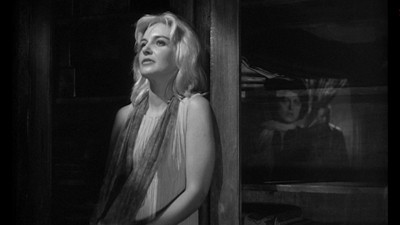
The mythological Orpheus was a master of the lyre and a singer of songs. The most well-known story about him, and the one that Williams was referencing in Orpheus Descending, involves the musician heading down into the underworld to rescue his wife, Eurydice, from the grips of Hades. His songs move the heart of the oppressor and earn the woman a second chance at life. Except on the way out, Orpheus hesitates. Despite being told to get out of the underworld and not turn around until he is through to the surface, Orpheus looks back at his wife when only part of the way to freedom, and her soul is damned for eternity.
Williams and Lumet transplant this old story to the American south. Val leaves a life of abandon for the more constricted, isolated small town where the locals either dole out punishment (the men are bullies, the women judgmental gossips) or are damned (characters regularly refer to this place as being a prison). Carol, for instance, is punished for her transgressions. The alcoholic party girl is also a political provocateur, challenging the racial divides prevalent at the time, and beat down for it. Woodward plays Carol as unhinged, but in much the same way a caged animal loses its sense of perspective. She can't beat the zookeepers, so she can only bang on the cage.
Race is a big issue in The Fugitive Kind, and so is sex. Both transgressions are met with small-minded justice. Lady dared to love once. As a youth, she had an affair with Carol's older brother (John Baragrey), but the price for it is that now she is in a loveless marriage with a sour man. She is trapped in a place that is too small for her, and one that has already brought her much damnation. We don't know how this Italian family got there, but her father once ran a little wine bar on the outskirts of the 'burg, only to have it burned down--and he with it--because he sold some liquor to black customers. It was the same summer that Lady's romance ended, and she's carried the hate from it ever since.
Val has a philosophy about the world, that there are only two types of people, the ones that are bought and sold, and the ones doing the buying and selling. Everything has a price, including human flesh. (Indeed, the implication of his story at the start of the movie is that he was prostituting himself.) There is also a third type, but it's so rare as too hardly count. It's this group that Carol dubs "the fugitive kind." These are the folks that choose to get out of the cycle. Val likens them to birds with no legs, ones who can never land and must always stay high in the sky, above the predatory hawks that would knock them down. They "sleep on the wind" and only touch the ground when they die. Val is this type, Carol is this type, shouldn't Lady also be? She definitely has plenty to run away from, and she certainly doesn't fit in where she's at.
As his name suggests, Valentine Xavier is no ordinary man. He is a strange creature with odd habits, described as being a "peculiar talker." Names in The Fugitive Kind obviously mean something. "Lady" is the lady of the story, the damsel in distress, and a "Valentine" is a trinket, an object of contrived emotion that uses love as barter for sex. Lumet points out in the extras that this particular pheromone factory's full name is a play on "Saint Valentine the Savior." Every woman who comes into contact with this Valentine wants him in some way, even if it's just to mother him like Mrs. Talbot. They are drawn to him like moths to flame. (Val describes himself thus: "My temperature's always a couple of degrees above normal, the same as a dog.") Likewise, Val knows what these women feel. His presence inspires them to confess what is inside of them. In a very tender scene, he talks to Mrs. Talbot about her painting. A far too kind a soul to be married to the mean-hearted Sherriff, Mrs. Talbot has taken up art to express herself. She can't explain it, it's precisely because she doesn't have the words that she has turned to the canvas, and Val's claims to understand soothe her. The kindness that passes between them is quiet, and it's just as powerful as any of the more assertive emotions that flare up elsewhere. Maureen Stapleton's performance is heartbreaking.
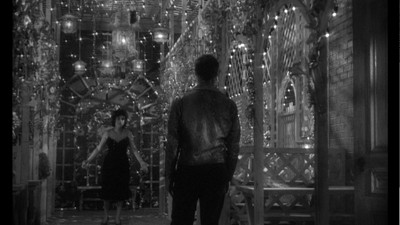
If Val is a figure of myth, then the world he lives in must also be mythic. Sidney Lumet and director of photography Boris Kaufman, along with art director Richard Sylbert, create an isolated environment, one that is moody and at times overwrought. The graveyard that Carol takes Val to is like an oasis in the dark, and the bright lights that filter through the foliage around it make it look like a portal into another world. In contrast, the dusty town is like some kind of pit, a hole in the earth. The interior sets are either bare (the roadhouse, the bedrooms) or overly packed (the jail, the Torrance store). In one sense, we see the poverty and the isolation; in another, we see how small everything is. These people are stuck together, they can't help but be on top of one another. If it's not Hell, it's at least Purgatory, a stop along the way (Orpheus is descending, after all, he's not there yet). Jape Torrance sweats his life away up in his room, the presiding death dealer, and the store beneath him has an understated surreal quality, like Dante rejigged for commerce. In opposite corners, still mannequins stand like guards, watching what goes on.
When Lady takes Val out to the ruins of her father's wine garden, we see that it was once a colorful escape from the dreariness of the village. Lady is hoping to recreate that place of peace and celebration, she is building her own little nightclub on the side of the store. She calls it the Confectionary, and when it's put together, decorated with tinsel and hanging lights and flowers, it looks like a wedding chapel. Like the graveyard, it's a romantic gateway to somewhere else. It's a symbol of love and happiness, and a big f.u. to the hardened hearts of the men around her. She knows that amongst the townsfolk are the racist "vigilantes" who killed her father. In truth, her exile is self-imposed, she is waiting to find the truth and punish the murderers.
These various elements give The Fugitive Kind a palpable tension. The heat between Val and Lady is met in intensity by the doom hanging in the air. If they finally come together, it will surely be the end of them both. Yet, like the classic myth, there is an inevitability to their coupling. This is there fate. Everything Val does only seduces Lady more, feeding her loneliness and need. This makes Val a fugitive from his own nature. He wants desperately to get away from her, to not ensnare her with his charms or be ensnared by her desire, but he can't. He tries, he's on his way, but she draws him in. He turns around before he's gotten out of the underworld. Love forces the bird to land.
As noted at the outset, the pairing of Magnani and Brando is pretty significant. Anna Magnani is a forceful screen presence, and her powerful performances in films directed by the likes of Rossellini, Renoir, and Passolini are unforgettable. Her acting is fired by an inner force, something that can't be entirely articulated, it's just when you see her, she seems so real that you want to know what more there is. It's impossible to take your eyes off of her. It's a quality that Brando also possesses, yet his method makes him seem mercurial and unknowable, whereas Magnani is solid. When they come together, it's like ocean waves beating against a concrete shore. They are their characters: he can't be grasped, she can't be moved.
Though Brando reportedly found Magnani unattractive, there is still a sexual spark between them. Perhaps he knew what he was doing, he was turning himself into something she could not have to draw her out. Apparently his mush-mouthed delivery made it hard for the Italian-born actress to pick up her cues. She had learned her lines phonetically, though you would never know it. With these two actors, expression transcends language. Ironically, it's just this kind of actor that can wrestle with Williams's often overwritten poetry and make it sound believable. Brando in particular sucks the pretention right out of it by making the lines sound so off the cuff.
The constant references to heat are apt. This is Hell, and the fires will burn as they will. The Fugitive Kind builds to an incendiary climax, one befitting the story's classic origins. It's also one that befits the tumultuous politics of the times. Small-minded morality and the brutality that comes with it was on its way out, and though they may have seemed crazy, it's the ones who saw the sea change coming that also kept moving forward. Not sure if that's by choice, Williams seems to say they are unmoored. If it's a sea change, they are stuck beating against the tide. The Fugitive Kind seems more cynical about social progress than hopeful. In the final scenes, it's suggested that there is no changing who people are. The skin we wear, the very nature of our beings, cannot be shed, only transmuted. The sellers and the sold may be condemned to stagnation, but those who would be free are condemned to forever be separate, to always wander, and never be blessed with the growth their stubbornness may inspire.
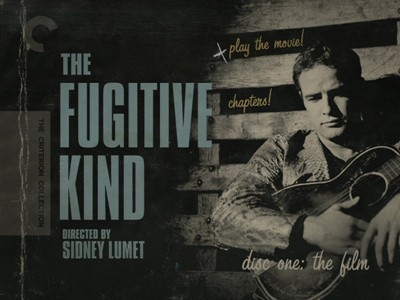
THE DVD
Video:
Lumet and Sylbert shot The Fugitive Kind at a 1.66:1 aspect ratio, and this new digital transfer gives us a fantastic black-and-white anamorphic image. The contrasts between dark and light are expertly balanced, with deep, inky blacks and blistering whites. The surface image is mostly clean. There are a couple of instances where a faint line appears running vertically down the screen, and this line is very thin and not all that noticeable. It's likely an irreversible flaw in the source material.
The Fugitive Kind was released on DVD once before, in 2005, and though I have not seen that disc, DVD Savant gave it very low marks, noting that the disc had "a disappointing non-enhanced 1:66 letterboxed transfer that doesn't allow what looks like some atmospheric photography to shine as it might." This Criterion reissue is obviously much better, having corrected both of Savant's major complaints.
Sound:
The new mono mix of the soundtrack sounds great. There are subtle plays in volume, from quietly spoken lines to big bursts of music and raging weather. There is no distortion or external hiss, the DVD sounds excellent.
English subtitles are available for the deaf and the hearing impaired.
Extras:
Criterion's The Fugitive Kind is a 2-disc set in a standard-sized clear plastic case with a staggered double tray. The 16-page interior booklet is generously illustrated with photos, alongside cast and crew credits and an essay by David Thomson about the production. The chapter listing for the movie is printed on the inside front cover.
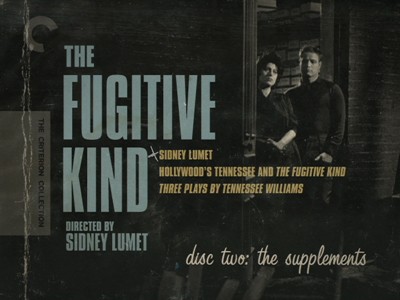
DVD 1 is devoted to the movie, DVD 2 is all the supplements--and what supplements they are! The lead extra is a new interview with Sidney Lumet (27 minutes, 45 seconds), who talks about his history with Williams's material and his personal interpretation of what his plays are about. He discusses directing Williams on television, as well as the history of Orpheus Descending and how it became The Fugitive Kind. He also talks about learning his craft in TV and moving into motion pictures.
That TV work is actually presented here for our pleasure. Fans of live television of the 1950s will be pleased to find the hour-long Kraft Television Theatre production, Three Plays by Tennessee Williams, collecting "Moony's Kid Never Cries" (starring Ben Gazzara and Lee Grant), "The Last of My Solid Gold Watches" (starring Thomas Chalmers), and "This Property is Condemned" (starring Zina Bethune and Martin Huston). These three plays show three different ages, three stages of life: childhood/pre-adolescence in "Property," early adult life in "Moony's," and old age in "Gold Watches." In each stage, there is a sense of disillusion and disappointment, the characters have all seen that the promise of whatever life has preceded them was false, and the tomorrow they hoped for is not waiting for them. In some cases, it's their own future that is faltering, and in the case of Chalmers in "Gold Watches," it's that the whole world is changing and going in such a way that not only has he become obsolete, but all that he thought he accomplished no longer matters. The theme in Williams is always of a dream deferred. Even in The Fugitive Kind, Snakeskin has realized that the high life is not so high, and Lady has discovered love is a hard, bitter thing. These one-acts move quickly, and the acting is exceptional. Sidney Lumet was a facile director, agile in the live arena, and this production sizzles.
The final extra is a documentary called Hollywood and The Fugitive Kind" (27:30). It features Robert Bray and R. Barton Palmer, the authors of Hollywood's Tennessee, a book about Hollywood's many adaptations of the Williams oeuvre. They contextualize the original plays and talk about how the material translated to the motion picture format and in this case, arguably even improved on the source. It includes a more detailed look at the evolution of the this manuscript from its original form as Battle of Angels to Orpheus Descending and on to The Fugitive Kind.
FINAL THOUGHTS:
The Fugitive Kind - Criterion Collection is a double-disc release of the 1960 drama starring screen legends Marlon Brando and Anna Magnani. This hot-blooded, overtly poetic adaptation of Tennessee Williams is a stylish, emotional production from director Sidney Lumet. Featuring top-notch acting and a near-surreal lighting style, the tragic love story is infused with sweat and tears, and it's also a snapshot of a tumultuous political time in the American South. With a new transfer and a trio of excellent extras, The Fugitive Kind - Criterion Collection is Highly Recommended.
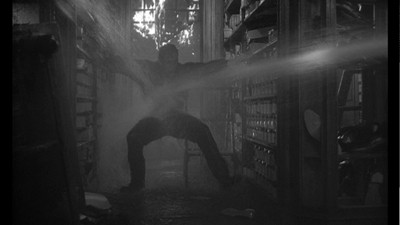
Jamie S. Rich is a novelist and comic book writer. He is best known for his collaborations with Joelle Jones, including the hardboiled crime comic book You Have Killed Me, the challenging romance 12 Reasons Why I Love Her, and the 2007 prose novel Have You Seen the Horizon Lately?, for which Jones did the cover. All three were published by Oni Press. His most recent projects include the futuristic romance A Boy and a Girl with Natalie Nourigat; Archer Coe and the Thousand Natural Shocks, a loopy crime tale drawn by Dan Christensen; and the horror miniseries Madame Frankenstein, a collaboration with Megan Levens. Follow Rich's blog at Confessions123.com.
|
| Popular Reviews |
| Sponsored Links |
|
|
| Sponsored Links |
|
|
| Release List | Reviews | Shop | Newsletter | Forum | DVD Giveaways | Blu-Ray | Advertise |
|
Copyright 2024 DVDTalk.com All Rights Reserved. Legal Info, Privacy Policy, Terms of Use,
Manage Preferences,
Your Privacy Choices | |||||||









